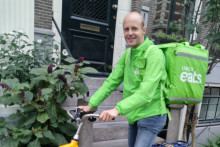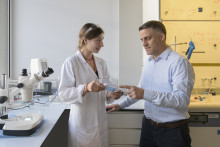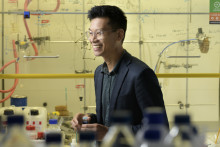Jeroen Meijerink has signed up with food delivery platforms Uber Eats and Deliveroo. He wanted to experience first-hand what it’s like to work through such platforms and to have your ‘job’ largely dictated not by colleagues or supervisors, but by algorithms.
‘It’s a part of my ongoing research project on Human Resource Management (HRM) in the gig economy,’ says the scientist. ‘It’s a first step to explore what HRM looks like in an environment where there is no employment relationship, no job security, but where many HR activities still occur. The workers still experience certain levels of control, performance evaluation, incentives and so on, but in this case these activities are performed by algorithms or customers, not by HR staff or line managers.’
gigs & uber eats
The gig economy could be defined as an economy in which permanent contracts are no longer the norm. It is instead characterized by short-term ‘gigs’, tasks that can last hours or even just minutes. Uber, Deliveroo and Amazon Mechanical Turk are all examples of platforms belonging to the gig economy.
Uber Eats is an online food ordering and delivery platform also active in the Netherlands, in cities including Amsterdam, Rotterdam, Utrecht and Groningen. Customers can order meals through the Uber Eats app and their food is brought to them by one of the many registered (and currently available) deliverers – usually by bike.
‘The devil is in the details’
Meijerink has been delivering food for science since early 2018. He has also involved a number of students in the project. Most recently, Alina Gervald, a business administration student who follows the Human Resource Management track, joined Meijerink and is using the experience for her Master thesis. Together they have performed a couple of dozen deliveries in Amsterdam over the past months. ‘We have conducted many interviews with workers, but the personal experience is very valuable. The devil is in the details,’ says Meijerink.
‘The interviewees tend to skip many important details,’ clarifies Gervald. ‘For example, we found out that you don’t get to see any appraisal until you’ve performed ten deliveries and that you only receive an average score. That is something we never heard in interviews, but it is important. How can you learn from an average score? How do you know what you did right or wrong during the specific deliveries?’
‘Challenging but also great fun’
What else surprised them about the business? ‘When you see people delivering food on their bike it looks very easy, but it’s definitely not,’ answers Gervald. ‘It’s tiring and stressful, especially if you don’t know the city so well. You need to be fast. You are paid per delivery, but you don’t know upfront how much you will get for the order. However, it is also nice. People are always happy to see you because you are bringing them food.’
‘It can be challenging but it is also great fun,’ adds Meijerink. ‘It’s fascinating to see the different types of customers. On my first day I delivered breakfast to a woman who opened the door in just her pajamas. There is actually a running gag among deliverers that they prefer to work on Sunday mornings because this happens often. On a more serious note, it’s remarkable to see how some people approach you. I had to deliver to bankers, lawyers and corporate consultants in ‘Amsterdam Zuid’ and I really didn’t like how they looked at me. They look at you like you are scum. “Just give us the food and leave” sort of thing. Also, in this case it took me one minute to deliver the food from the restaurant to the customer. One minute! Why wouldn’t you fetch it yourself?’
‘It was surprising to see what type of people order through the Uber Eats app,’ agrees Alina Gervald, who has had fun with delivering food to a man in the Red Light District. ‘Ordering through the app can be quite expensive, but there are many people who do it on daily basis. Many of them say it’s just because they are lazy. It seems like a lot of money to pay for laziness.’

Alina Gervald during an Uber Eats delivery
Not your employer
The interaction with customers was indeed enlightening for the researchers, but they point out that from the customer perspective these gig economy services are not that different from other existing platforms such as Thuisbezorgd.nl. The biggest difference hides in the workers’ perspective.
‘While Thuisbezorgd employs their delivery people, workers on Uber Eats or Deliveroo are all self-employed,’ explains Meijerink. ‘If you are eligible to work, speak Dutch or English and you are over 18 years old, you can sign up with Uber Eats. You just have to pass what they call a test, but it’s actually not a test at all. I failed on purpose and I could retake it as many time as I wanted. There is no selection involved. But the company is extremely careful about how they phrase their activities. They can’t call it a training – although the test essentially is a training – because then they could be viewed as employers.’
Outsourcing
This is where Jeroen Meijerink’s main interest lies. ‘In general, we observed outsourcing of all HR activities,’ he says. ‘The platform companies do whatever it takes to not be classified as employers. Yes, your fee is paid by Uber Eats but on behalf of the restaurants that pay you through the Uber service. Uber is only an intermediary. Unlike normal employers, Uber doesn’t tell you how to do your job. It doesn’t evaluate your performance, the customers do that. This is very interesting. Outsourcing is usually done because it’s cheaper. In this case it’s done for legal reasons.’
It has been reported that workers in the gig economy are often paid below the minimum wage. Is this true based on the UT scientists’ experience? ‘You get paid per delivery and on average you earn 10 – 15 euros per hour,’ says Gervald. ‘I would say that is a fair payment, especially if you are a student. But it is difficult to earn a full salary like this. We’ve heard of people who have to work 60 hours a week to make a living. Moreover, there are no employee benefits. No sick leave, no insurance, no pension.’
‘I will keep doing it’
Alina Gervald is finishing her Master thesis and therefore doesn’t plan to deliver food anymore. Jeroen Meijerink, however, aims to keep riding his bike with a big thermal bag on his back. ‘I will keep doing it because this is a highly volatile business, it keeps changing and I want to know how and why. I also plan to explore Uber in other countries and publish a paper based on data from all the different platforms.’







